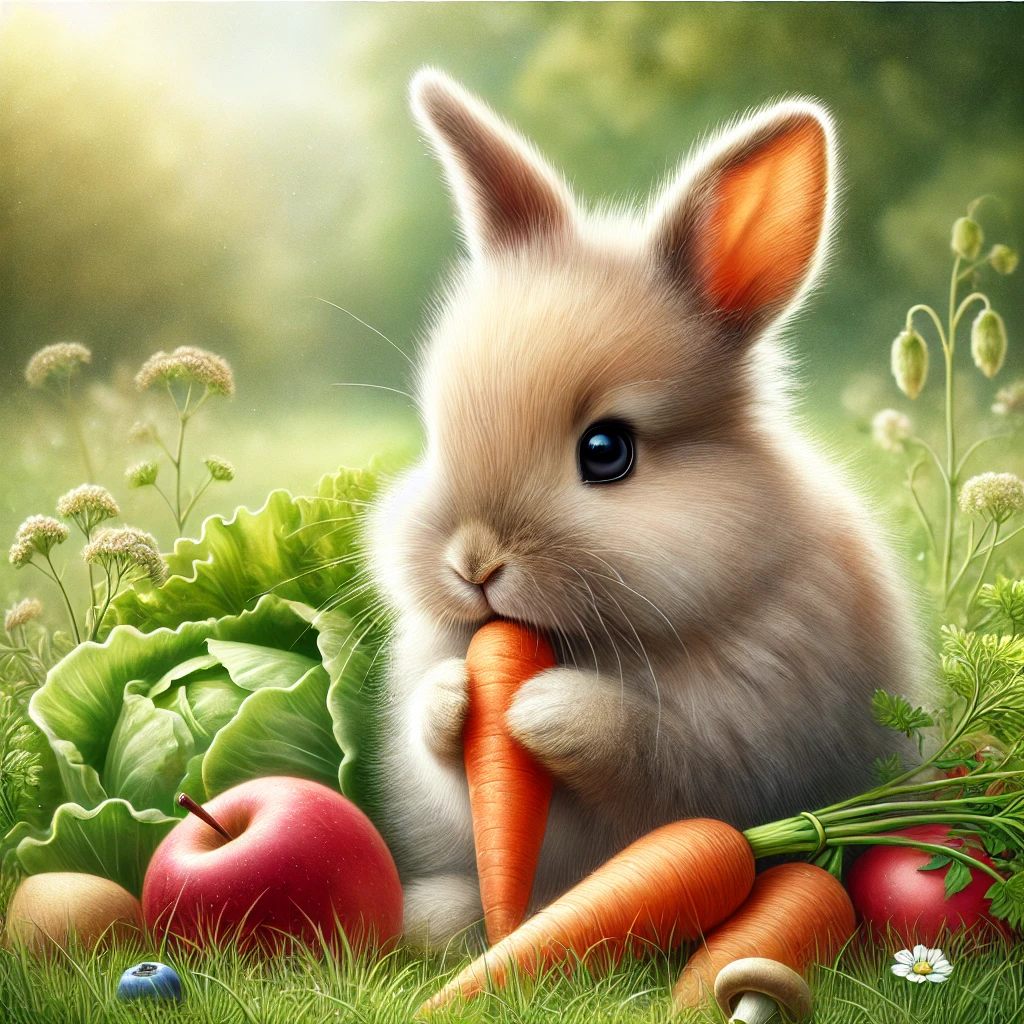Rabbits thrive on a balanced and nutritious rabbit diet or rabbit food, which goes beyond just carrots and lettuce.But these are far from what their diet should be. That’s why we have designed our ultimate guide to rabbit food, full of essential information and tips to make your bunny healthy and content.
A proper rabbit diet should include high-quality hay, fresh vegetables and fruits, and a limited amount of pellets. Hay should comprise the bulk of a rabbit’s diet as it assists in digestion and oral hygiene. Fresh vegetables and fruits in moderation will provide vitamins, and pellets are important sources of essential nutrients. Rabbits, however, have very sensitive digestive systems.
they should gradually be exposed to new foods or changed gradually from hay to pellets for their systems to adjust to the changes. Find everything you need to know here in this guide about rabbits’ daily dietary needs, what to avoid, and creating a well-rounded food plan for your furry companion.
Best Vegetables for Rabbits: Rabbit Diet
The diet and health of rabbits will necessitate eating a balanced mix with hay comprising 80% of its rabbit food so it remains healthy to digest as well as to chew for dental reasons. Fresh vegetables should be around 10% of the rabbit food in total so that in addition to nutrition, this will provide some texture or water since they don‘t drink too much.
Fruits are surely not good sources of water for the rabbit and below 5% can be tolerated within their overall consumption. A variety in rabbit food serves to enrich it while sustaining a nutritious diet that provides happy, healthy bunnies.
Quantity of Vegetables to Feed Rabbits
A balanced rabbit diet is crucial to keeping a healthy bunny, with different guidelines for baby and adult rabbits. For young rabbits, vegetables should only be introduced gradually after 12 weeks of age because their digestive systems are still developing.
Adult rabbits require about one cup of packed greens per two pounds of body weight daily. Hydration is great, but one should introduce changes to the rabbit diet slowly, one vegetable at a time, to check for digestive issues such as diarrhea or gas.
For rabbits with sensitive digestion, it may be necessary to rely more on hay and pellets rather than fresh greens. Spoiled vegetables will harm a rabbit’s delicate system, so only feed them fresh, quality produce. Proper balanced nutrition for rabbits will give an owner a healthy and confluent pet.
Rabbit’s favorite foods: Vegetables
Raisins, lettuce, cucumber, and many more varieties are consumed by rabbits and can also be used as a supplement for their diet. Adult rabbits can be fed up to 2 cups of fresh vegetables per day, though smaller breeds and rabbits under 5 pounds should have only 1 cup.
Two to three kinds of vegetables in their rabbit food is ideal, with new types introduced slowly to watch for digestive problems. Feed rabbits not potatoes, corn, beans, seeds, or nuts as these may make a rabbit ill in the digestive tract. A well-balanced diet with safe, fresh veggies keeps bunnies happy and healthy.
Rabbit can eat daily Vegetables
- Radish tops
- Watercress
- Wheat grass
- Zucchini
- Bell peppers
- Carrot tops
- Cucumber
- Endive
- Escarole
- Herbs: Basil, cilantro, dill, mint, oregano, parsley.
- Lettuces: romaine, green leaf, red leaf.
Fruit once or twice per week in Rabbit diet
Fruit can be offered to rabbits once or twice a week as a treat, with a serving size of 1-2 tablespoons per 5 pounds of body weight. Introduce fruits slowly, one at a time, to monitor for any digestive issues.
Fruit to feed your rabbit:
- Cherries
- Grapes
- Melon
- Plum
- Watermelon
- Orange
- Papaya
- Pear
- Apple
- Banana
Avoid feeding rabbits:
A healthy rabbit diet also provides knowledge of which foods should be avoided. Many common human treats are toxic for rabbits, including chocolate and candy or chips. Several high-carb vegetables-even seemingly innocuous-sounding ones like iceberg lettuce or cauliflower–can cause a digestive upset and should be avoided.
Some of these foods have a high content of sugar and artificial coloring, added seasonings, and some grains and corn that may disturb the delicate system of the rabbit. Toxic plants that should not be fed to rabbits are daffodils, rhubarb leaves, and potato and tomato plant stems.
New vegetables must be slowly introduced to prevent stomach upset, as rabbits are not conditioned for sugary foods. Feeding rabbits with the right amount and quality of food can encourage them to be healthy and active in general.
Some of the food you have to avoid to your rabbit.
- Chocolate
- Corn or corn-cob treats
- All human treats
- Beans
- Beet greens
- Cabbage
- Cauliflower
- Rhubarb
- Seeds
- Sugar
- Turnip greens
- Yogurt
- Nuts
- Pasta
- Peas
- Potatoes
Check ingredients, fiber content, and freshness when buying rabbit pellets online.
Now, purchase pellets meant for your rabbit from an online store in India. Today, there are plenty of varieties formulated for various stages of their lives and also for health requirements such as junior, senior, and weight management. Chose the pellets that your rabbit needs.
High fiber, low protein pellets based on timothy hay should be your favorite as this promotes digestion and fights obesity. Look for natural flavorings and hedgerow ingredients from reputable brands that focus on small animal nutrition.
Consult a veterinarian for dietary recommendations, particularly during the early stages of young rabbits, to ensure proper nutrition and to avoid potential health problems.

